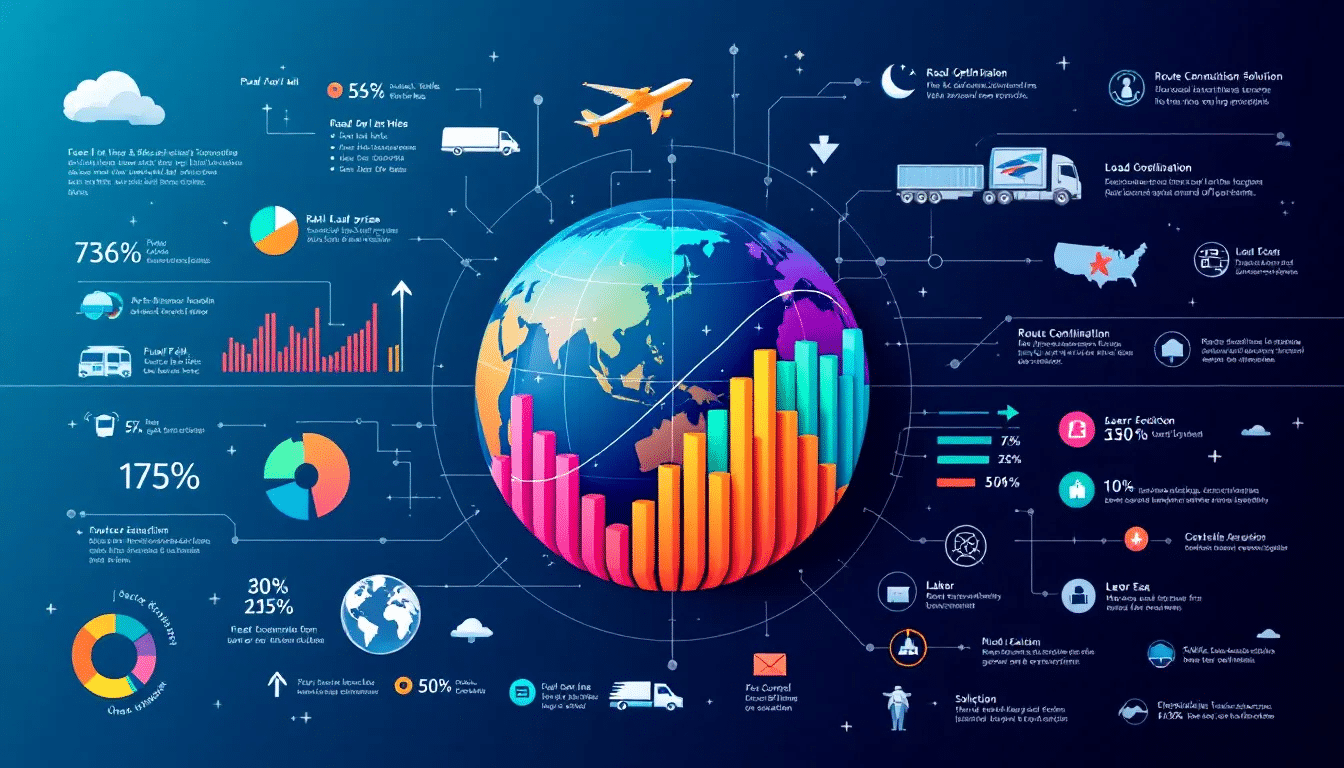Transportation spend management is the process of tracking and analyzing your transportation costs to identify ways to decrease spending without limiting performance. It relies on data insights and smart management tools to help identify savings and make operations more efficient.
If logistics costs are greatly limiting your corporate budget, you’re not alone. Encompassing all forms of transportation, including parcel and freight shipping, your overall logistics spending can take up a significant amount of your spending for a given year.
Transportation spend management is vital for controlling logistics costs and boosting efficiency. It represents a more organized approach to getting these parcel and freight costs back under control.
By taking a comprehensive view of transportation spending across channels and combining expert knowledge with high-tech solutions, you can rein in your company’s transportation costs, helping you maintain your competitive advantage.
Key Takeaways
- Transportation spend management involves meticulous tracking, analysis, and optimization of logistics expenses to enhance efficiency and identify cost-saving opportunities.
- Your business needs to leverage transaction spend management solutions to secure favorable contracts, meet rising customer expectations, and scale your operations as supply chains get faster and more complex.
- Leveraging technology that uses machine learning, accesses real-time data, and enables automation in transportation spend management helps streamline operations, enhance cost savings, and improve freight spend visibility.
What Is Transportation Spend Management?
Transaction spend management (TSM) helps you optimize your shipping and freight spending by analyzing financial transactions and operations to uncover inefficiencies. Its goal is to make sense of the endless streams of data associated with logistics throughout your supply chain, providing you with digestible and actionable insights.
You can use these insights to make cost-effective decisions about your operations and negotiate with carriers, lowering your transportation spend. However, you’ll need the right transportation management system (TMS) to make the process time and cost-effective.
What Are The Benefits of Transportation Spend Management?
Effective transportation spend management comes with a variety of different benefits, but they mostly revolve around saving money.
TSM can lower your transportation spending by:
- Recovering billing errors and discrepancies
- Lowering labor costs by automating time-consuming processes
- Helping you choose the right carriers
- Arming you with the data you need to negotiate carrier contracts
- Identifying optimal routes to lower fuel costs and shipping times
- Highlighting freight consolidation opportunities
In addition to saving money, benefits of TSM like optimized routing, packaging optimization, increased delivery reliability, and better scalability can also lead to less of an environmental impact, simpler compliance with transportation laws and regulations, and higher customer satisfaction.
Why Do Companies Need To Control Their Transportation Spending?
Your organization needs to take a closer look at its logistics spending for one crucial reason — that spending likely takes up a significant part of your overall budget.
Without the right tools, it takes a lot of time and effort to stay on top of your spending. There are more moving parts than ever and customer expectations have risen, so if you want to lower your transportation costs, you’ll need to conduct a deep analysis into things like carrier contracts.
Rising Expectations
Over the past few decades, businesses across industries have increasingly come to depend on the fast, reliable movement of goods. The current age is defined by e-commerce, in both business-to-consumer and business-to-business verticals.
Buyers placing online orders for delivery have a great deal of choice about what brand to work with, along with high expectations for shipment timelines.
Providing a great customer experience now means being better than competitors in measurable ways — either in the speed of your shipments, the price you charge for delivery or the amount of information you can provide while goods are in transit. Ideally, your brand will excel at all these aspects.
Aggressive Carrier Contracts
Meeting those audience expectations means relying on your carriers — both the bulk freight shippers who provide raw materials to your brand and the last-mile parcel carrier services that distribute products to buyers.
Your contracts with freight carriers and parcel shipping partners allow you to stay competitive and fast-moving, and these agreements have arguably never been more important than they are today.
However, these partners tend to change the terms of their contracts. Increases in shipping rates through contract revisions are common, and it may be difficult to have the upper hand in negotiations, as agreements today are long and complex.
Making matters more complicated, a significant portion of those transportation expenses could technically be avoidable. For instance, a freight carrier or parcel carrier may be missing service level agreements or assessing unfair surcharges.
Fighting back against this constant tide of rate increases and new clauses can be challenging. It’s difficult to detect these issues amid the flood of data from a modern supply chain. Weeks or months after the fact, you may realize a carrier has made significant changes to rates and terms based on the new invoices you’re receiving.
Changing Conditions, Regulations, and Costs
The conditions you need to adapt to as a shipper are constantly changing. You have to adhere to changing global regulations, overcome restrictive international freight laws, compensate for rising fuel and labor costs, and navigate unpredictable market dynamics.
All of these conditions add another layer of complexity to trying to manage your spending and stick to your budget. However, they also present the opportunity for smart management solutions to streamline operations, improve efficiency, and identify cost-saving opportunities.
The Need for Future-Proof Operations
Will your company be able to grow naturally over time? If transportation spending is hard to track and optimize, it can be challenging to scale up, add capacity, and keep pace with the competition. Healthy profit margins are hard to attain when carrier contracts are growing out of control, or these agreements are littered with hidden clauses.
Some organizations are poised for scalable growth, with highly automated and highly visible supply chain operations. Other less-prepared businesses may find their logistics capabilities straining as they grow their audiences. Effective transportation spend management can help put you in the former group.
Discover how the recent labor agreement between the teamsters and UPS affected overall shipping costs.
What Goes Into a Good Transportation Spend Management Solution?
Fast-moving digital supply chains can be limited by a few factors, including a lack of visibility into operations and the accumulation of unnecessary parcel and freight costs. These two issues work together — if you’re having trouble monitoring logistics operations amid large flows of data, it’s tough to detect or crack down on excess spending.
A suitable modern transportation spend management solution cuts through those issues, delivering a more streamlined, affordable approach to the supply chain. But what does this mean in practice? What traits and components come with transportation supply management?
The following are a few of the telltale signs of an effective, impactful approach:
A Wide Scope, Covering All Transportation Methods
From freight audit and payment to carrier contract negotiations and beyond, you should have processes in place to view and control every kind of transportation. When all these capabilities are gathered under one umbrella, the resulting level of visibility can help your stakeholders ensure every cent is accounted for.
A Strong Dose of Automation
Manual work is a problem in today’s fast-paced, data-rich logistics processes. When employees try to drill down into data or audit carrier contracts manually, the result is inefficiency and ineffectiveness. Automation helps stakeholders sort through large and fast-moving data with reliable accuracy, letting each employee accomplish more with their time.
Powerful and User-Friendly Analytics
Performing business intelligence functions is one way to assess the performance of transportation operations at a regional, shipper, or time period scale and take action. The best way to refine the raw data into actionable, meaningful insights is to present it via specialized and easy-to-interpret dashboards, visualizations and widgets.
In-Depth Audit Capability
Contracts today are long and complex, and they can hide opportunities for cost savings. As part of a transportation spend management effort, it pays to closely study every freight carrier and parcel carrier contract through a freight audit or parcel audit, comparing the terms to actual performance. There may be unclaimed refunds, service level failures, and more potential reimbursements hidden within these documents.
Contract Optimization
Whether negotiating with a new carrier or renegotiating an existing freight or parcel contract, it’s worth taking a data-based, expert-driven approach to optimization. This process is a way to combat consistent rate increases, fee additions, and terms adjustments that are common among both parcel and freight shipping contracts. Then, it’s important to monitor that the new terms are being met.
See how great transportation spend management makes use of data analytics.
Why Work With An Expert Transportation Spend Management Partner?
When it’s time to implement transportation spend management, a high-quality solution can have major, long-lasting benefits for your organization. To maximize that potential, you should make sure you’re working with the best possible partner for your purposes.
What defines a great transportation spend management provider? The calculation comes down to a few traits — technology, experience and relationships.
Technology
Logistics is a digital business today. Data is constantly flowing in, from every invoice, every real-time shipping update and every carrier contract. Without the right automation tools and analytics systems, all this data can become opaque and difficult to manage. With that technology in place, the raw data turns into fuel for powerful, actionable insights.
Industry Experience
While technology is a key component of modern supply chain oversight, the best transportation spend management partners aren’t solely technology companies. Rather, these organizations are made up of individuals who know the shipping world and are capable of offering insightful recommendations based on their own knowledge and background, providing targeted guidance to get results.
Strong Relationships
The bond between your organization and its transportation spend management partner is perhaps the most important component in getting more effective results. Close collaboration can ensure that you’re not just pursuing generic, standard goals for supply chain excellence — you’re working to pursue your own business objectives and implementing solutions relevant to your freight and parcel carriers.
Learn more about what goes into shipping cost optimization.
What Does the Future Look Like for Your Supply Chain?
Combining experience and responsiveness with the most advanced technology is Zero Down Supply Chain Solutions’ approach to transportation spend management. Our team is made up of experienced supply chain professionals who put their know-how to work providing auditing, analysis and optimization throughout your supply chain contracts to control your overall transportation costs.
Our proprietary FreightOptics transportation spend management system offers automation and analytics features that make modern logistics operations possible. The solution’s highly customizable and user-friendly dashboards, visualizations and widgets ensure you have access to all the necessary information from your logistics operations, from the highest level to the most granular view.
This combination of expertise and technology can help you future-proof your transportation operations. Even as your business grows and competition becomes fiercer around delivery times, visibility, and cost efficiency, you’ll be ideally positioned to keep your supply chain on track.
Interested in making transportation spend management work for you? Don’t wait — contact us.
Frequently Asked Questions
What is Transportation Spend Management (TSM)?
Transportation Spend Management (TSM) is a strategic approach to managing and optimizing transportation costs, involving tracking, analyzing, and using data to improve efficiency and reduce costs while maintaining service quality.
How does technology aid in Transportation Spend Management?
Technology like Transportation Management Systems (TMS) and machine learning optimizes routes, streamlines administrative processes, and provides real-time data. You can leverage this data to enhance decision-making and save money as part of your transportation spend management.
What are some key factors that influence transportation costs?
Key factors that influence transportation costs include fuel prices, labor market conditions, government regulations, and changes in market dynamics. These factors have a significant impact on the cost structure of transportation operations.
Can effective TSM improve customer satisfaction?
Yes, effective TSM can improve customer satisfaction by optimizing delivery times and providing cost-effective shipping options, leading to happier customers.
What future trends should companies be aware of in TSM?
The future of transportation spend management involves adopting sustainable practices and utilizing predictive analytics for anticipating changes. These trends will be crucial for future success in transportation and supply chain management, so choosing software or a partner like Zero Down is essential for future-proofing your operations.
Brad McBride, CEO and Founder of Zero Down Supply Chain Solutions is a dynamic leader with over 30 years of experience in the supply chain sector. His journey began at Consolidated Freightways in 1988, where he mastered freight logistics and pricing. His career led him to Eagle Global Logistics, diving into international freight forwarding and leading high-volume shipping projects.
Read More




